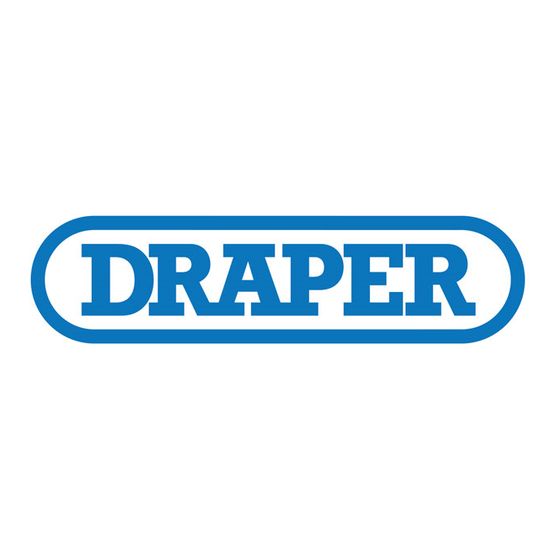Draper CDH120V Podręcznik użytkownika - Strona 5
Przeglądaj online lub pobierz pdf Podręcznik użytkownika dla Wiertarka Draper CDH120V. Draper CDH120V 12 stron. Cordless hammer drills

WARNING
Please read the following instructions carefully, failure to do so could lead to serious personal injury.
IMPORTANT
Draper Tools Limited recommends that this machine should not be modified or used for any application other
than that for which it was designed. If you are unsure of its relative applications do not hesitate to contact us in
writing and we will advise you.
1.
KNOW YOUR POWER TOOL
Read and understand the owner's manual and labels
affixed to the tool. Learn its application and limitations as
well as the specific potential hazards peculiar to this tool.
2.
KEEP WORK AREA CLEAN
Cluttered areas and benches invite accidents. Floors must
not be slippery due to oil or sawdust.
3.
AVOID DANGEROUS ENVIRONMENTS
Do not use power tools in damp or wet locations, or
expose them to rain. Keep work area well lit. Provide
adequate space surrounding the work area. Do not use in
environments with a potentially explosive atmosphere.
4.
KEEP CHILDREN AWAY
All visitors should be kept a safe distance from work area.
5.
STORED TOOLS
When not being used, all tools should be stored in a dry,
locked cupboard or out of the reach of children.
6.
WEAR PROPER CLOTHING
Do not wear loose clothing, neckties or jewellery (rings,
wristwatches) to catch in moving parts. NONSLIP footwear
is recommended.Wear protective hair covering to contain
long hair. Roll long sleeves above the elbow.
7.
USE SAFETY GOGGLES (Head Protection)
Wear CE approved safety goggles at all times. Normal
spectacles only have impact resistant lenses, they are
NOT safety glasses. Also, use face or dust mask if
application is dusty and ear protectors (plugs or muffs)
during extended periods of operation.
8.
NOISE LEVELS
Some types of machines may have high noise levels when
working. In such cases ear protection must be worn.
9.
VIBRATION LEVELS
Hand held power tools produce different vibration levels.
You should always refer to the specifications and relevant
Health and Safety guide.
10.
DUST EXTRACTION
If your tool is fitted with a dust extraction fitting, always
ensure that it is connected and being used with a dust
extractor.Vacuum cleaners can be used if suitable for the
material being extracted.
11.
PROTECT YOURSELF FROM ELECTRIC SHOCK
When working with power tools, avoid contact with any
earthed items (e.g. pipes, radiators, hobs and
refrigerators, etc.). If you are using a power tool in
extreme conditions (e.g. high humidity or generating
metal dust), always use an RCD (residual current device)
at the power socket.
12.
STAY ALERT
Always watch what you are doing and use common sense.
Do not operate a power tool when you are tired or under
the influence of alcohol or drugs.
13.
WHEN WORKING OUT OF DOORS
Only use extension leads designed for that purpose.
14.
ACCESS TO MAINS SOCKET
If a stationary machine is fitted with a moulded plug and
cable, the machine should not be positioned so that
access to the mains socket is restricted.
IMPORTANT NOTE
Residual Risk. Although the safety instructions and operating manuals for our tools contain extensive
instructions on safe working with power tools, every power tool involves a certain residual risk which can not be
completely excluded by safety mechanisms. Power tools must therefore always be operated with caution !
GENERAL SAFETY INSTRUCTIONS
FOR POWER TOOLS
15.
DISCONNECT POWER TO THE TOOL
When not in use, before servicing and when changing
accessories such as cutters, etc.
16.
AVOID ACCIDENTAL STARTING
Make sure the switch is in the OFF position before
plugging the machine into the power supply.
17.
NEVER LEAVE MACHINE RUNNING UNATTENDED
Turn power off. Do not leave machine until it comes to a
complete stop.
18.
DO NOT ABUSE THE CORD
Never carry the tool by the power cable or pull it from
the socket. Keep the power cable away from heat, oil and
sharp edges.
19.
NEVER STAND ON TOOL
Serious injury could occur if the tool is tipped or if the
cutting tool is accidentally contacted. Do not store
materials above or near the tool, so that it is necessary to
stand on the tool to reach them.
20.
CHECK DAMAGED PARTS
Check for damage to parts, breakage of parts, mountings
and any other conditions that may affect its operation.
A guard or other part that is damaged should be properly
repaired or replaced.
21.
KEEP GUARDS IN PLACE
And in working order.
22.
MAINTAIN TOOLS WITH CARE
Keep tools sharp and clean for the best and safest
performance. Follow instructions for lubricating and
changing accessories. All extension cables must be
checked at regular intervals and replaced if damaged.
Always keep the hand grips on the tool clean, dry and
free of oil and grease.
23.
USE RECOMMENDED ACCESSORIES
Consult the owners manual for recommended
accessories. Follow the instructions that accompany the
accessories. The use of improper accessories may cause
hazards.
24.
REMOVE ADJUSTING KEYS AND WRENCHES
Form a habit of checking to see that keys and adjusting
wrenches are removed from the tool before turning it on.
25.
SECURE WORK
Use clamps or a vice to hold work. This frees both hands
to operate the tool.
26.
DO NOT OVERREACH
Keep proper footing and balance at all times.
27.
USE RIGHT TOOL
Do not force the tool or attachment to do a job for which it
was not designed.
28.
DO NOT FORCE TOOL
It will do the job better and safer at the rate for which it
was designed.
29.
DIRECTION OF FEED
Feed work into a blade or cutter against the direction of
rotation of the blade or cutter only.
30.
WHEN DRILLING OR SCREWING INTO WALLS
Always make sure there is no danger of hitting any hidden
power cables, water or gas pipes in the wall.
- 4 -
